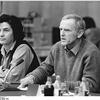Johannes Bobrowski (1917–1965)
Author of Levin's Mill
About the Author
Works by Johannes Bobrowski
Penguin Modern European Poets : Johannes Bobrowski and Horst Bienek : selected poems (1971) — Author — 16 copies
Como Respirar : Antologia Poética 4 copies
Der Mahner : Erzählungen 4 copies
Uczta Myszy I Inne Opowiadania 2 copies
The Mouse Festival {short story} 2 copies
Gesammelte Werke, 5. Bd. - Erläuterungen der Gedichte und der Gedichte aus dem Nachlaß (1998) 2 copies
Znamení popela 1 copy
Sarmatische Zeit - Gedichte 1 copy
Hans Clauerts wunderseltsame, abenteuerliche und unerhörte Geschichten, kurzweilig und sehr lustig zu lesen (1988) 1 copy
Johannes Bobrowski : meine liebsten Gedichte : eine Auswahl deutscher Lyrik von Martin Luther bis Christoph Meckel; mit (1986) 1 copy
Briefe 1937-1965 1 copy
Associated Works
The New Sufferings of Young W. and Other Stories from the German Democratic Republic (1997) — Contributor — 10 copies
Tagged
Common Knowledge
- Canonical name
- Bobrowski, Johannes
- Legal name
- Bobrowski, Johannes Konrad Bernhard
- Birthdate
- 1917-04-09
- Date of death
- 1965-09-02
- Burial location
- Christophorus-Friedhof, Berlin-Friedrichshagen, Duitsland
- Gender
- male
- Nationality
- Germany
- Birthplace
- Tilsit, East Prussia, Germany
- Place of death
- Berlin, Deutschland
- Cause of death
- appendicitis
- Occupations
- Lyriker
Erzähler
Members
Reviews
Lists
Awards
You May Also Like
Associated Authors
Statistics
- Works
- 62
- Also by
- 13
- Members
- 367
- Popularity
- #65,579
- Rating
- 4.1
- Reviews
- 4
- ISBNs
- 68
- Languages
- 7
- Favorited
- 4












Johannes Bobrowski was a German writer who was born in Tilsit/Sowetsk, a town close to Königsberg/Kaliningrad, now on the Lithuanian border. He was from a Christian family who were opposed to the Nazis, but still, he became a soldier. He served on the campaign in Russia and was later imprisoned there until 1949.
Because of these experiences, Bobrowski's main topic was the European east, its natural world, but also its history. Most of his poems deal with the Lithuanian/East Prussian landscape of the region where he grew up, or with the Russian landscape around Nowgorod, where he was stationed during the war. Bobrowski moved to Berlin after he returned from prison and lived there until his death, so with the exception of a few poems that were written in the 1940s, he wrote about the east from memory, and created a magical and unreal region. This was supported by his usage of the ancient name Samartia - a poetic version of the land, but not a perfect one, because there are the shadows of the war and of the holocaust. There are people who go to their death, buildings that are destroyed and decayed, there is a cold and dangerous feeling that disturbs the often lyrical descriptions of nature. Emotions of loss and guilt - both Bobrowski's personal guilt as a soldier, as well as Germany's collective guilt - influence these poems.
During his lifetime, Bobrowski was one of the few authors who were equally read and respected in both German states, despite dealing with the politically and morally difficult topics mentioned above, which were treated differently in the two Germanys. Bobrowski himself wanted to be just a 'German' writer and did not wish to pledge allegiance to one of the two, and he was successful in that. He was a friend of some of the most important writers of the time, such as Günter Grass, Uwe Johnson and Paul Celan.
Bobrowski's poems are often not easy to understand, as they are full of metaphors and images, as well as deeply intertextual. Some are dedicated or written in response to other writers (alive or long deceased), others reference myths and legends. His continuous use of enjambement, of neologisms and inversions creates a special rhythm that does not always feel natural. Despite the often dreamlike quality of his poetry, it is firmly rooted in reality, often being connected to specific places that are mentioned or described. The language often includes prefixes used in a surprising way and an unusual syntax, which builds an atmosphere that makes the reader feel that despite the beautiful nature, something is wrong. For sure, I have only scratched the surface of Bobrowski's work with these poems.… (more)